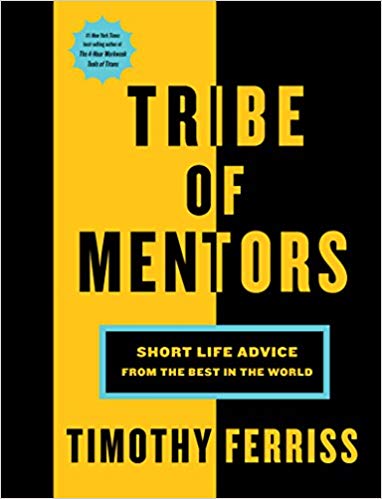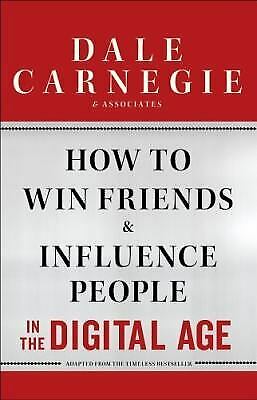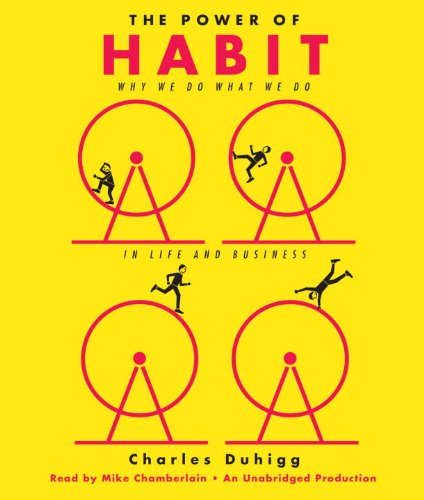All of us at Adventure Treks are continually striving to learn more about the world around us, whether it’s reading up on the the latest in youth development or attending professional development conferences to further hone our skills. Below, we’d love to share the latest books we’ve read and podcasts we’ve listened to and our takeaways from them!

Tribe of Mentors by Tim Ferriss (Dmac’s pick)
Tim is the author of The 4-Hour Workweek and host of the Tim Ferriss Show podcast. In Tribe of Mentors, the author found himself asking existential questions after experiencing several personal losses in a short time. Rather than mull himself into a hole, he reached out to more than 100 people he considers his idols and asked each of them the same 11 questions; in short, he crowdsourced the answers and compiled them in his new 600-page tome. A few of his questions include:
- What is the book (or books) you’ve given most as a gift, and why? Or what are one to three books that have greatly influenced your life?
- What purchase of $100 or less has most positively impacted your life in the last six months (or in recent memory)?
- In the last five years, what new belief, behavior, or habit has most improved your life?
- What advice would you give to a smart, driven college student about to enter the “real world”? What advice should they ignore?
Advice comes from Kelly Slater, Jimmy Fallon, Maria Sharapova, champion weightlifters, grandmaster chess players, and quantum scientists (to name a few). Not all 11 answers are published for each person; sometimes it’s only one, other times it’s all 11. Tribe of Mentors is a quick read and filled with unique ideas about what these people do with their time and money and how they stay focused (or what they do if they lose focus).
What I really appreciate about Tribe of Mentors is that it shows several ways “successful” people do things. Not everything resonates, and some answers are in direct contradiction to other people’s answers. But that is part of the point; there isn’t any one way to be successful. Approaching life and careers your way and being authentic to yourself and your style are key to discovering the endurance to succeed.
 How to Win Friends and Influence People in the Digital Age by Dale Carnegie (Dmac’s pick)
How to Win Friends and Influence People in the Digital Age by Dale Carnegie (Dmac’s pick)
In Warren Buffett’s office hangs a certificate of completion for taking the “Dale Carnegie Course in Effective Speaking, Leadership Training, and the Art of Winning Friends and Influencing People.” He said this class changed his life and improved his interactions with business associates, friends, and his spouse. If Warren Buffett says this was one of the best things he ever did, I figured I should try to glean some of that knowledge myself.
Upon first glance, this (updated) book offers fairly standard advice:
- Don’t criticize, condemn, or complain
- Give honest, sincere appreciation
- Be genuinely interested in others
- Smile
- Remember a person’s name (as it is the sweetest sound in any language to that person)
The book is a very easy read with easy concepts, ones I have been trying to put into practice daily. I’ll admit, it is a challenge, even for things that seem so simple.The steps and concepts are as old as time, and all seems straightforward. How hard can it be to not complain? This one concept is harder than it sounds. Recently, Will Bowen, created the 21-day “no complaint” challenge. You wear a purple bracelet and for 21 days try to not complain or tell others they are complaining. If you do either, you switch the bracelet to the other wrist and start over at day 1. Come to find out, there is a six-month wait list to get a bracelet!
When I first started at Adventure Treks, Dock’s desk was right by the entrance. Every day, when someone left, Dock would thank them for something they did that day. This always made me feel good and made me want to work hard the next day. Giving an honest compliment to a coworker can seem awkward, but the pay-off from doing that has been huge. I can honestly say I don’t practice everything in this book or even half of it, half of the time. But doing even some of it, some of the time has been paying off. Can I directly attribute other people’s actions or work ethic to my compliments? No. But did doing these things help? Perhaps, and it certainly doesn’t hurt to implement them.
How to Win Friends is a great read for anyone—middle or high school student, college graduate, or even retiree. There is something easy and digestible for everyone inside. Just think, if we all practiced these simple concepts, what would our society look like?
 The Power of Habit: Why We Do What We Do in Life and Business by Charles Duhigg (Stacey’s pick)
The Power of Habit: Why We Do What We Do in Life and Business by Charles Duhigg (Stacey’s pick)
I’ve recently become fascinated by the topic of “habits,” but many self-help books these days are too dry or focus only on what seems obvious and logical but not the most helpful (“just wake up an hour earlier and you can change your life!”). I wanted to learn some science behind habit formation so I could better understand my own behaviors. Most often, when we talk about habits, we’re talking about negative ones. But Duhigg’s book helps us understand that habits are a part of our brains’ necessary operation. Without habits, our brains wouldn’t be able to digest and store new information.
Duhigg, an award-winning investigative reporter for The New York Times, brings a conversational and journalistic approach to the subject. He dives into the research done by scientists that led to the discovery of the habit loop, helping explain the neurological processes that occur in our brains every day in a way that even a non-scientific brain can understand. Duhigg’s laid-back style makes it easy to relate the concepts to your own life, giving you the tools you need to analyze your own habit behaviors, whether you want to reconstruct a current habit or create a new one. He guides you through the habit loop: the process of what triggers the habit (the cue), the routine performed (the actual habit), and the real reward (the end result you’re trying to achieve).
By understanding this, you can then better adjust the cue and/or the routine in order to get the same reward, whether it’s ditching an unhealthy personal habit, creating a more efficient workflow at the office, or marketing a new product (did you know toothpaste wasn’t a thing until the founder shifted our dental hygiene habits? I didn’t, either.).
He also looks at specific examples of how understanding the habit loop has helped small and large companies shift behaviors with longer-lasting results than previously experienced. If you’re looking for a laundry list of tips to change your habits, this isn’t the book for you. But if you want to understand why you do what you do, then this New York Times bestseller shouldn’t disappoint.
 Three new podcasts (Stacey’s picks)
Three new podcasts (Stacey’s picks)
Speaking of habits! About a year ago, I decided to spend my commute to and from the AT office listening to a variety of podcasts. I set a goal of listening only to podcasts for one month. That turned into three months, then six, and while I’ve allowed myself to occasionally listen to my favorite Pandora stations, I’ve spent the majority of my commutes in the podcast world ever since.
Some of my favorites include She Explores, How I Built This, Hidden Brain, By The Book, and Armchair Expert. Hosted by Gale Straub, She Explores focuses on telling the stories of women who are inspired by time spent outside. NPR’s How I Built This is one of my favorites. Guy Raz sits down with the people behind some of the world’s best known companies, exploring how they got where they are and lessons they’ve learned along the way. Hidden Brain, hosted by NPR’s Shankar Vedantam, looks at the unconscious behaviors that shape our lives and the science behind them. Fair warning, there’s some “barnyard” language in By The Book, hosted by Jolenta Greenberg and Kristen Meinzer, but it’s worth it. These humorous hosts take popular self-help books, live by them for two weeks, and give their take on the experience. There’s also some “barnyard” language in Dax Shepard’s Armchair Expert episodes. He sits down with many of his celebrity friends and explores all the things that make us human (If you love Sam Elliott’s voice as much as I do, check out that episode). In each of these podcasts, you’ll hear stories of grit, resiliency, creativity and out-of-the-box thinking, optimism, and collaboration—many of the outcomes we strive to teach on Adventure Treks trips.